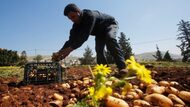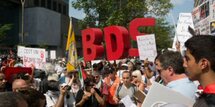4 feb 2020

The German multinational HeidelbergCement is complicit in the pillaging of natural resources from the Nahal Raba quarry in the occupied West Bank, with serious human and environmental rights violations against Palestinians, a new report by the Centre for Research on Multinational Corporations (SOMO) and Al-Haq shows.
Palestinian communities are affected by land grabbing, stealing of natural resources, and dust pollution as a resulted of HeidelbergCement’s activities.
The company is breaching international law in the Israeli-occupied Palestinian Territory, while avoiding responsibility for the violations it has been involved in, said the two rights groups in a press release.
For more than 13 years, the Nahal Raba quarry, located in Salfit in the West Bank, has denied Palestinian communities’ access to their lands and sources of livelihoods.
Moreover, Hanson Israel, the subsidiary of HeidelbergCement operating the quarry, sold products from the quarry to illegal Israeli settlements.
The German multinational also pays royalties to the Israeli Civil Administration, the body administering the occupied Palestinian territory.
HeidelbergCement’s presence in the area is a clear example of multinational corporations’ involvement in Israel’s prolonged occupation, systemic human rights abuses and the denial of the fundamental right to self-determination and sovereignty over natural resources, said SOMO and Al-Haq.
While the German multinational and the State of Israel pocket the profits of depleting the quarry’s 'white gold’, the Palestinian economy is stripped of millions of dollars annually in this sector, they added.
In addition, according to several testimonies, the crushing of stones in the quarry, day and night, comes with loud explosions and covers parts of the neighboring communities of al-Zawiya and Rafat with dust, affecting crops and air quality.
Maha Abdallah, from Al-Haq, said, “HeidelbergCement should immediately and responsibly cease all its activities on appropriated Palestinian land and in illegal Israeli settlements, and make reparations to Palestinians affected, including to those whose lands it has - in conjunction with the occupation authorities, unlawfully exploited”.
HeidelbergCement has seemingly deployed a number of strategies to avoid responsibility for its involvement in these human rights violations and grave breaches of international law. The company denies that its operations are on unlawfully confiscated land and hides behind policies and measures imposed by the Occupying Power for the confiscation and exploitation of Palestinian land and natural resources.
The company has structured its transnational corporate group into distinct legal entities and carried out its operations through an Israeli subsidiary which separates a corporation from its owner, thus insulating the parent company from liability. Furthermore, HeidelbergCement continuously tries to legitimize its operations in Nahal Raba with false claims about job opportunities and benefits for Palestinians.
Lydia de Leeuw, from SOMO, said: “The behavior of HeidelbergCement is not unique. Worldwide we see companies using strategies to avoid responsibility or being held accountable for human rights abuses and environmental damage.
We want to motivate duty bearers to close the governance gaps that allow these strategies to be applied.”
Palestinian communities are affected by land grabbing, stealing of natural resources, and dust pollution as a resulted of HeidelbergCement’s activities.
The company is breaching international law in the Israeli-occupied Palestinian Territory, while avoiding responsibility for the violations it has been involved in, said the two rights groups in a press release.
For more than 13 years, the Nahal Raba quarry, located in Salfit in the West Bank, has denied Palestinian communities’ access to their lands and sources of livelihoods.
Moreover, Hanson Israel, the subsidiary of HeidelbergCement operating the quarry, sold products from the quarry to illegal Israeli settlements.
The German multinational also pays royalties to the Israeli Civil Administration, the body administering the occupied Palestinian territory.
HeidelbergCement’s presence in the area is a clear example of multinational corporations’ involvement in Israel’s prolonged occupation, systemic human rights abuses and the denial of the fundamental right to self-determination and sovereignty over natural resources, said SOMO and Al-Haq.
While the German multinational and the State of Israel pocket the profits of depleting the quarry’s 'white gold’, the Palestinian economy is stripped of millions of dollars annually in this sector, they added.
In addition, according to several testimonies, the crushing of stones in the quarry, day and night, comes with loud explosions and covers parts of the neighboring communities of al-Zawiya and Rafat with dust, affecting crops and air quality.
Maha Abdallah, from Al-Haq, said, “HeidelbergCement should immediately and responsibly cease all its activities on appropriated Palestinian land and in illegal Israeli settlements, and make reparations to Palestinians affected, including to those whose lands it has - in conjunction with the occupation authorities, unlawfully exploited”.
HeidelbergCement has seemingly deployed a number of strategies to avoid responsibility for its involvement in these human rights violations and grave breaches of international law. The company denies that its operations are on unlawfully confiscated land and hides behind policies and measures imposed by the Occupying Power for the confiscation and exploitation of Palestinian land and natural resources.
The company has structured its transnational corporate group into distinct legal entities and carried out its operations through an Israeli subsidiary which separates a corporation from its owner, thus insulating the parent company from liability. Furthermore, HeidelbergCement continuously tries to legitimize its operations in Nahal Raba with false claims about job opportunities and benefits for Palestinians.
Lydia de Leeuw, from SOMO, said: “The behavior of HeidelbergCement is not unique. Worldwide we see companies using strategies to avoid responsibility or being held accountable for human rights abuses and environmental damage.
We want to motivate duty bearers to close the governance gaps that allow these strategies to be applied.”
3 feb 2020

Minister of Agriculture Riyad Atari said the government has decided to prevent the entry of Israeli products into the Palestinian market.
The minister, in a statement to WAFA, said the government’s decision came in response to Israeli Minister of 'Defense' Neftali Bennet’s decision to ban the entry of Palestinian agricultural products into Israel.
Bennet’s decision came in retaliation to a four-months-long Palestinian Authority ban on importing Israeli calves.
The minister stressed that this decision, which will ban the entry of Israeli vegetables, fruits, carbonated soft drinks, juices, and mineral water into Palestinian market, aims to support Palestinian farmers’ steadfast and Palestinian national products.
This decision shall enter into force in 48 hours.
The minister, in a statement to WAFA, said the government’s decision came in response to Israeli Minister of 'Defense' Neftali Bennet’s decision to ban the entry of Palestinian agricultural products into Israel.
Bennet’s decision came in retaliation to a four-months-long Palestinian Authority ban on importing Israeli calves.
The minister stressed that this decision, which will ban the entry of Israeli vegetables, fruits, carbonated soft drinks, juices, and mineral water into Palestinian market, aims to support Palestinian farmers’ steadfast and Palestinian national products.
This decision shall enter into force in 48 hours.

Israeli War Minister Naftali Bennett’s decision to stop agricultural trade with the Palestinian Authority in the occupied West Bank came into force on Sunday morning.
Israeli channel 13 claimed, according to Al Ray, that Bennett’s decision was made allegedly in response to the Palestinian boycott of importing cattle and other livestock from Israel.
Last September, the Palestinian government announced a complete halt to the import of livestock from Israeli occupation.
It attributed the decision to its policy of economic disengagement from the “occupation economy.”
Israeli channel 13 claimed, according to Al Ray, that Bennett’s decision was made allegedly in response to the Palestinian boycott of importing cattle and other livestock from Israel.
Last September, the Palestinian government announced a complete halt to the import of livestock from Israeli occupation.
It attributed the decision to its policy of economic disengagement from the “occupation economy.”
20 jan 2020

Shabina Lafleur-Gangji
Ancient Roots Israel, set to be held near Tiberias next month, looks to be in jeopardy after the American Herbal Guild cancelled its participation following a campaign organized by a BDS activist which some claim works for the guild
The first international herbalist conference to ever be held in Israel looks to be in jeopardy after the event's main draw, the American Herbalist Guild has urged its members to cancel their participation in the prestigious event following a campaign organized by a group that seeks to promote all forms of boycott against Israel.
A pro-Israeli NGO, however, claims the activist is the AHG employee, making their decision a part of a wider conspiracy.
The Ancient Roots: International Herbal Conference is a "grassroots effort to bring the highest caliber of global talent" in herbal medicine to Israel.
It is initiated and organized by five herbal specialist form Israel as well as abroad, and is set to be held in a community settlement of Poria Illit, 6km south of Tiberias, between 9 and 11 of February.
Eleven herbal specialists from around the world had been booked to attend the conference with the most prominent organization in the field of herbal medicine, the American Herbal Guild (AHG), initially inviting all its members to attend the event in Israel. The guild's president even published a video message encouraging the participation of its members in the historic conference.
The prestigious guild, however, decided to pull its support after a BDS activist named Shabina Lafleur-Gangji, posted a Facebook message calling for a boycott of the Ancient Roots conference over Israel's mistreatment of the Palestinians.
"As some of you may know, a few prominent herbalists made the decision to endorse and/or lecture at the Ancient Roots herbal medicine conference in Israel," wrote Gangji.
"The conference had no Palestinian or Muslim speakers included in their lineup, yet included a speaker who referred to Palestinians as a non-people who willfully left their ancestral lands. I am someone who absolutely stands behind the BDS movement, not because I hate the Israelis, but because of the love I have for the Palestinians."
Following Gangji's post, two members of the AHG - one from the U.S. and another from Ireland - cancelled their participation in the conference. In addition, the guild's president demanded the conference's organizers remove his support video from their website.
As a result, ticket sales for the conference have dropped drastically.
Rivka Asulin, one of the Ancient Roots organizers, voiced her disappointment over the cancellation. "I was shocked, the BDS' attack on us was highly aggressive," she said. "They must think Tiberias is an illegal settlement for them to call on a boycott of our conference."
"We were shocked a political organization would take a none political conference on herbs, and use it for their own political gains, it was to be a non-political gathering of herbal experts from around the world, all volunteers," added Asulin. "We won't let the BDS win ... this project stems from my love for Israel and my wish for the world to witness Israel's ingenuity in the field of herbal medicine."
In the meantime, Reservists on Duty - an Israeli NGO that works to counter BDS efforts - claims that Gangji is actually the AHG's magazine editor-in chief, and that her efforts to boycott the conference was part of a wider conspiracy within the guild.
If the claims turn out to be accurate, it means the AHG broke its own ethical conduct, which states that the guild will not discriminate against a person or a country over political views.
"It's an impressive feat by the BDS," said the head of the Reservists on Duty, "we have no doubt the BDS infiltrates more and more organizations in order to further its boycott on Israel. The American people need to condemn such a shameful boycott of a U.S.-based organization."
Ancient Roots Israel, set to be held near Tiberias next month, looks to be in jeopardy after the American Herbal Guild cancelled its participation following a campaign organized by a BDS activist which some claim works for the guild
The first international herbalist conference to ever be held in Israel looks to be in jeopardy after the event's main draw, the American Herbalist Guild has urged its members to cancel their participation in the prestigious event following a campaign organized by a group that seeks to promote all forms of boycott against Israel.
A pro-Israeli NGO, however, claims the activist is the AHG employee, making their decision a part of a wider conspiracy.
The Ancient Roots: International Herbal Conference is a "grassroots effort to bring the highest caliber of global talent" in herbal medicine to Israel.
It is initiated and organized by five herbal specialist form Israel as well as abroad, and is set to be held in a community settlement of Poria Illit, 6km south of Tiberias, between 9 and 11 of February.
Eleven herbal specialists from around the world had been booked to attend the conference with the most prominent organization in the field of herbal medicine, the American Herbal Guild (AHG), initially inviting all its members to attend the event in Israel. The guild's president even published a video message encouraging the participation of its members in the historic conference.
The prestigious guild, however, decided to pull its support after a BDS activist named Shabina Lafleur-Gangji, posted a Facebook message calling for a boycott of the Ancient Roots conference over Israel's mistreatment of the Palestinians.
"As some of you may know, a few prominent herbalists made the decision to endorse and/or lecture at the Ancient Roots herbal medicine conference in Israel," wrote Gangji.
"The conference had no Palestinian or Muslim speakers included in their lineup, yet included a speaker who referred to Palestinians as a non-people who willfully left their ancestral lands. I am someone who absolutely stands behind the BDS movement, not because I hate the Israelis, but because of the love I have for the Palestinians."
Following Gangji's post, two members of the AHG - one from the U.S. and another from Ireland - cancelled their participation in the conference. In addition, the guild's president demanded the conference's organizers remove his support video from their website.
As a result, ticket sales for the conference have dropped drastically.
Rivka Asulin, one of the Ancient Roots organizers, voiced her disappointment over the cancellation. "I was shocked, the BDS' attack on us was highly aggressive," she said. "They must think Tiberias is an illegal settlement for them to call on a boycott of our conference."
"We were shocked a political organization would take a none political conference on herbs, and use it for their own political gains, it was to be a non-political gathering of herbal experts from around the world, all volunteers," added Asulin. "We won't let the BDS win ... this project stems from my love for Israel and my wish for the world to witness Israel's ingenuity in the field of herbal medicine."
In the meantime, Reservists on Duty - an Israeli NGO that works to counter BDS efforts - claims that Gangji is actually the AHG's magazine editor-in chief, and that her efforts to boycott the conference was part of a wider conspiracy within the guild.
If the claims turn out to be accurate, it means the AHG broke its own ethical conduct, which states that the guild will not discriminate against a person or a country over political views.
"It's an impressive feat by the BDS," said the head of the Reservists on Duty, "we have no doubt the BDS infiltrates more and more organizations in order to further its boycott on Israel. The American people need to condemn such a shameful boycott of a U.S.-based organization."

Five United Nations special rapporteurs have unveiled a letter to the German government censuring a German law that targets a pro-Palestinian boycott movement while insisting that criticism of the Israeli regime “is not anti-Semitic.”
The UN experts made the letter public this week, after the 60-day reply period ended without a response from the German officials in Berlin, the UK-based Middle East Eye reported Friday.
In May 2019, the German parliament passed a motion condemning the Boycott, Divestment and Sanctions (BDS) movement as anti-Semitic.
In their October letter, the UN officials challenged the German law as “anti-Semitic” and called on Berlin to provide information on how the anti-BDS legislation complies with international human rights law, freedoms of opinion and expression, and the right to peaceful assembly.
The law – titled “Resisting the BDS Movement with Determination – Combating Anti-Antisemitism” – falsely accuses BDS of utilizing “patterns and methods” used by the Nazis during the Holocaust.
Reacting to passage of the German law, the BDS movement — founded in 2005 by Palestinian activists — accused Berlin of “complicity in Israel’s crimes of military occupation, ethnic cleansing, siege and apartheid.”
In their letter, the UN experts also pointed out that the law “unduly interferes with the right of people in Germany to engage in political speech, namely, to express support for the BDS movement.”
“We further express our concern that the motion may hinder the peaceful activities of human rights defenders, groups and organizations denouncing human rights violations as part of the BDS movement by shrinking the civic space available to them to express legitimate grievances,” they wrote, according to Al Ray.
The German city of Dortmund reversed its decision, last September, to award a literary prize to novelist Kamila Shamsie, due to her support for the BDS movement.
The Israeli regime, meanwhile, has tasked its ministry of strategic affairs and public diplomacy — a body founded in 2006 that collaborates with Tel Aviv’s interior ministry — to organize campaigns against the BDS movement.
It issued a list back in 2018 consisting of nearly 20 international NGOs whose members would be denied entry into the Israeli-occupied territories. The list also included the UK-based Palestine Solidarity Campaign organization.
The UN experts made the letter public this week, after the 60-day reply period ended without a response from the German officials in Berlin, the UK-based Middle East Eye reported Friday.
In May 2019, the German parliament passed a motion condemning the Boycott, Divestment and Sanctions (BDS) movement as anti-Semitic.
In their October letter, the UN officials challenged the German law as “anti-Semitic” and called on Berlin to provide information on how the anti-BDS legislation complies with international human rights law, freedoms of opinion and expression, and the right to peaceful assembly.
The law – titled “Resisting the BDS Movement with Determination – Combating Anti-Antisemitism” – falsely accuses BDS of utilizing “patterns and methods” used by the Nazis during the Holocaust.
Reacting to passage of the German law, the BDS movement — founded in 2005 by Palestinian activists — accused Berlin of “complicity in Israel’s crimes of military occupation, ethnic cleansing, siege and apartheid.”
In their letter, the UN experts also pointed out that the law “unduly interferes with the right of people in Germany to engage in political speech, namely, to express support for the BDS movement.”
“We further express our concern that the motion may hinder the peaceful activities of human rights defenders, groups and organizations denouncing human rights violations as part of the BDS movement by shrinking the civic space available to them to express legitimate grievances,” they wrote, according to Al Ray.
The German city of Dortmund reversed its decision, last September, to award a literary prize to novelist Kamila Shamsie, due to her support for the BDS movement.
The Israeli regime, meanwhile, has tasked its ministry of strategic affairs and public diplomacy — a body founded in 2006 that collaborates with Tel Aviv’s interior ministry — to organize campaigns against the BDS movement.
It issued a list back in 2018 consisting of nearly 20 international NGOs whose members would be denied entry into the Israeli-occupied territories. The list also included the UK-based Palestine Solidarity Campaign organization.
19 jan 2020

The motion was passed unanimously by Jordan's 130 lawmakers following weekend protests around the country against the new energy deal between the two countries
Jordan's parliament on Sunday approved a draft law to ban imports of Israeli gas to the country just days after they started under a multibillion-dollar deal struck in 2016 which is opposed by much of the population.
The motion was passed unanimously by Jordan's 130 lawmakers and will be referred to the cabinet to be made law, although legal hurdles may prevent it coming into force.
The government has previously said it was a deal between companies rather than a political matter.
The $10 billion supply deal was originally struck between Jordan's state-owned utility and a U.S. Israeli consortium led by Texas-based Noble Energy, to provide gas to the country's power plants for electricity generation.
It was not referred to parliament for approval.
Although U.S. ally Jordan has a peace treaty with Israel the deal, which supplies Jordan for 15 years, has faced much popular opposition, with lawmakers arguing it makes the kingdom dependent on its neighbor for energy.
Many Jordanians are also the descendants of Palestinians who moved to the country after the creation of Israel in 1948 and view Israel as an erstwhile enemy that expelled their ancestors from their homes.
The Jordanian government said after the agreement was signed in 2016 that securing stable energy prices for the next decade could achieve annual savings of at least $500 million and help reduce a chronic budget deficit.
The import of Israeli gas has become a major focus in Jordan and sparked protests and calls for both the deal and the peace treaty to be scrapped.
"The gas of the enemy is an occupation. Down with the gas deal," placards carried by protesters said.
Jordan's ties with Israel have come under increasing strain since the gas deal was struck as Israel has moved to the right and since Donald Trump replaced Barack Obama as U.S. president.
Jordan's King Abdullah fears Israel's rejection of a Palestinian state in the occupied West Bank could spark renewed violence and see a new generation of Palestinians relocating to Jordan.
Jordan's parliament on Sunday approved a draft law to ban imports of Israeli gas to the country just days after they started under a multibillion-dollar deal struck in 2016 which is opposed by much of the population.
The motion was passed unanimously by Jordan's 130 lawmakers and will be referred to the cabinet to be made law, although legal hurdles may prevent it coming into force.
The government has previously said it was a deal between companies rather than a political matter.
The $10 billion supply deal was originally struck between Jordan's state-owned utility and a U.S. Israeli consortium led by Texas-based Noble Energy, to provide gas to the country's power plants for electricity generation.
It was not referred to parliament for approval.
Although U.S. ally Jordan has a peace treaty with Israel the deal, which supplies Jordan for 15 years, has faced much popular opposition, with lawmakers arguing it makes the kingdom dependent on its neighbor for energy.
Many Jordanians are also the descendants of Palestinians who moved to the country after the creation of Israel in 1948 and view Israel as an erstwhile enemy that expelled their ancestors from their homes.
The Jordanian government said after the agreement was signed in 2016 that securing stable energy prices for the next decade could achieve annual savings of at least $500 million and help reduce a chronic budget deficit.
The import of Israeli gas has become a major focus in Jordan and sparked protests and calls for both the deal and the peace treaty to be scrapped.
"The gas of the enemy is an occupation. Down with the gas deal," placards carried by protesters said.
Jordan's ties with Israel have come under increasing strain since the gas deal was struck as Israel has moved to the right and since Donald Trump replaced Barack Obama as U.S. president.
Jordan's King Abdullah fears Israel's rejection of a Palestinian state in the occupied West Bank could spark renewed violence and see a new generation of Palestinians relocating to Jordan.
